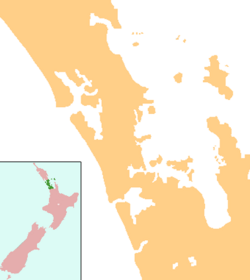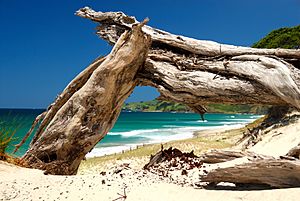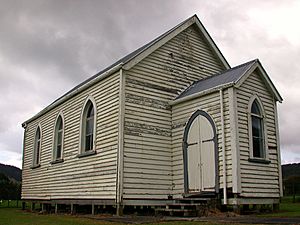Pākiri facts for kids
Pākiri is a small place located in the Auckland Region of New Zealand. The town of Leigh is about 9 kilometers (5.6 miles) to the south-east. The Pākiri River flows through this area and into the Hauraki Gulf / Tīkapa Moana, which is a large body of water.
The name Pākiri comes from a Ngāti Wai chief named Te Kiri. The beach was originally called Ngā One Haea o Pākiri, meaning "The Gleaming White Sands of Pakiri." Pākiri was also the name of a traditional Māori village (pā) located near the Pākiri River. The Ngāti Manuhiri people, who are related to the early Ngāti Wai ancestors, are the traditional guardians (mana whenua) of the Pākiri area.
Quick facts for kids
Pākiri
|
|
|---|---|
| Country | New Zealand |
| Region | Auckland Region |
| District | Auckland Council |
| Community board | Rodney Local Board |
| Subdivision | Wellsford subdivision |
| Area | |
| • Total | 28.52 km2 (11.01 sq mi) |
| Population
(2018 Census)
|
171 |
Pākiri Beach and Regional Park
Pākiri Beach is a beautiful 14-kilometer (8.7-mile) long white sandy beach. It is a popular spot for tourists who enjoy nature and the outdoors.
In 2005, the Auckland Regional Council bought land here to create the Pākiri Regional Park. This park covers about 178 hectares (440 acres) and includes 3 kilometers (1.9 miles) of beach. It helps protect the natural environment for everyone to enjoy.
History of Pākiri
During the 1860s, Pākiri Beach was home to a sawmill. This mill was used to process kauri timber, which was a very important resource in New Zealand's early history. The sawmill was located at the mouth of the Pākiri River.
Since the 1950s, sand has been collected from the sea floor off the coast of Pākiri. This process is called sand mining. In 1994, there was a disagreement about taking a large amount of sand to help restore Mission Bay in Auckland. This raised questions about protecting the environment and respecting Māori traditions of guardianship (kaitiakitanga).
Who Lives in Pākiri?
Pākiri is a small community. In the 2018 New Zealand census, 171 people lived in the area. This was an increase of 30 people since the 2013 census.
There were 57 households in Pākiri. The community had slightly more males than females. The average age of people living in Pākiri was 45.4 years. About 17.5% of the population was under 15 years old.
Most people in Pākiri identify as European. However, a significant number of people (35.1%) identify as Māori. Some people also identify as Pasifika or other ethnicities.
Education
Pākiri School is a local school for children from years 1 to 8. It is a coeducational school, meaning both boys and girls attend. Many of the children at Pākiri School are of Māori descent. They are connected to the Ngāti Wai and Ngāti Manuhiri tribes. The school celebrated its 125th anniversary in 2002, showing its long history in the community.
 | Precious Adams |
 | Lauren Anderson |
 | Janet Collins |




